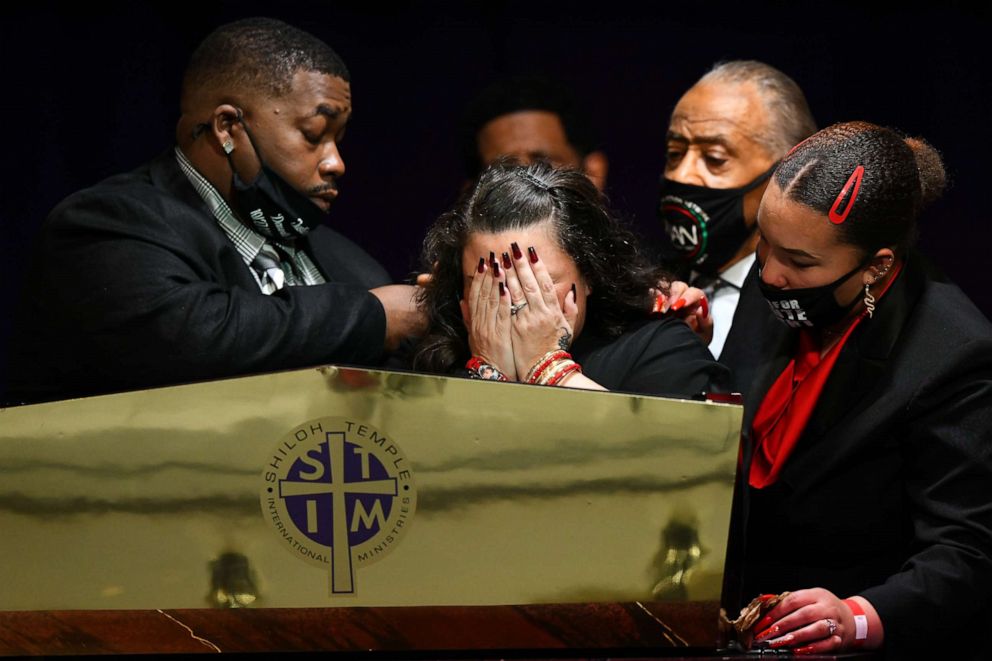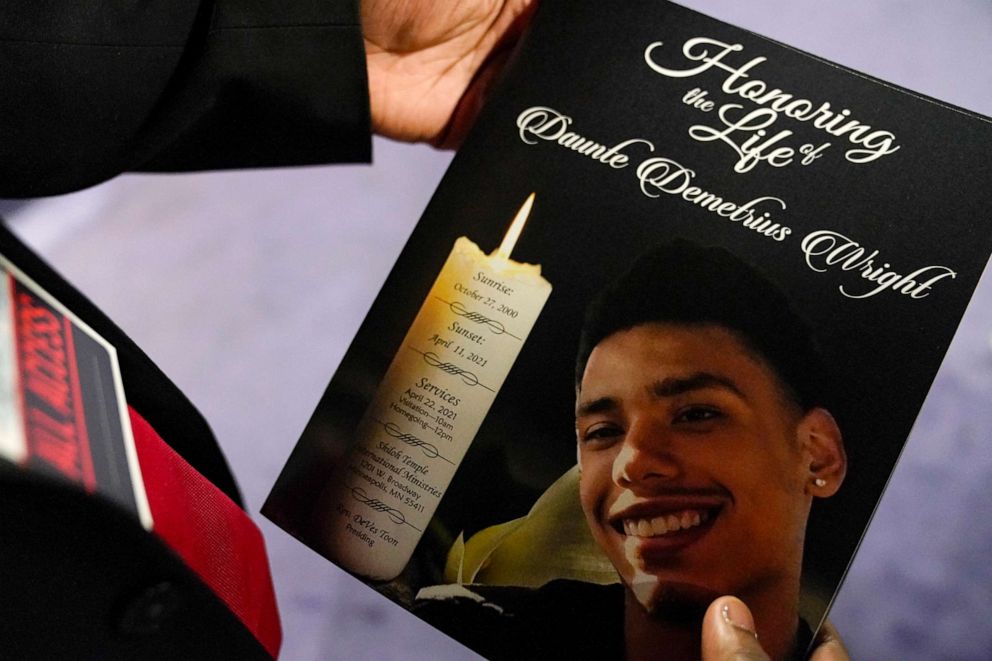Jury selection begins in trial of Kim Potter, former cop who shot, killed Daunte Wright
Former police officer Kim Potter is charged with first and second-degree manslaughter in the death of Daunte Wright.

MINNEAPOLIS -- Jury selection in the case of the former Brooklyn Center, Minnesota police officer charged with killing a Black man during a traffic stop earlier this year, is set to begin Tuesday -- a high-profile incident that was captured on video and sparked a new wave of protests.
Kim Potter, who is white, has been charged with manslaughter in the fatal shooting of Daunte Wright, which happened just outside of Minneapolis during the murder trial of former Minneapolis police officer Derek Chauvin in the killing of George Floyd.
Floyd's death prompted a national conversation concerning race and policing -- and Wright's death reignited protests across the country against racism and abuse of force.

While the defense team has argued Wright's death was an accident -- Potter grabbing her gun instead of Taser -- prosecutors say the veteran training officer should not have been reaching for her stun gun in the first place.
In a statement to ABC News, Wright's family described him as a young father who "had a whole life ahead of him."
"We just want people to know Daunte was a good kid," Wright's family said in the statement. "He loved being a father to Daunte Jr."
"Daunte had a smile to make anyone's heart melt. He was definitely a jokester, he loved to joke with people, especially his brothers and sisters," the family added. "He did not deserve this."
Wright's mother, Katie, thanked the community in a Monday press conference for the support as she and family members prepare for the trial.
"Everybody who's been there for us, standing with us, on one of the worst days of our life, one of the worst months going forward of our life, we really thank you and we appreciate this," she said.

A traffic stop turns deadly
On April 11, Wright was driving in Brooklyn Center, about 10 miles northwest of Minneapolis, when he was stopped by police. The officers initially pulled him over for an expired registration tag on his car but determined that he had an outstanding warrant for a gross misdemeanor weapons charge, according to former Brooklyn Center Police Chief Tim Gannon.
The warrant was filed in April against Wright for carrying or possessing a pistol without a permit and fleeing a police officer, according to Hennepin County District Court records. Officers told Wright he was being arrested for the outstanding warrant.
Wright followed orders to get out of the car and the officers attempted to take him into custody. But Wright resisted arrest and freed himself and got back into his car, according to the video.
After that, the officers and Wright appeared to scuffle, with Wright in the driver's seat and Potter warning Wright several times that she would "tase" him.
But instead of her stun gun, she had drawn her firearm and shot him once in the chest before he drove off, traveling several blocks before his car crashed into another vehicle, according to Gannon. Officers and medical personnel "attempted life-saving measures" on Wright, Gannon said, but he died at the scene.
Wright drove off, traveling several blocks before his car crashed into another vehicle, according to Gannon. Officers and medical personnel "attempted life-saving measures" on Wright, the police chief said, but he died at the scene.
The shooting appeared to surprise Potter, who can be heard on the police body camera footage saying "Holy s---, I just shot him!" and "I'm going to prison."

Gannon said Potter intended to deploy her stun gun instead of her firearm when she "accidentally" shot Wright.
"It is my belief that the officer had the intention to deploy their Taser, but instead shot Mr. Wright with a single bullet," Gannon told reporters in an April 12 press conference. "This appears to me, from what I viewed and the officer's reaction and distress immediately after, that this was an accidental discharge that resulted in the tragic death of Mr. Wright."
Potter is a 26-year BCPD veteran, former union president, and was serving as a field training officer at the time of the incident. She and Gannon resigned two days after the incident, following a resolution from the city council in support of relieving Potter and Gannon of their duties.
"I have loved every minute of being a police officer and serving this community to the best of my ability, but I believe it is in the best interest of the community, the department, and my fellow officers if I resign immediately," Potter wrote in her resignation letter.
Negligence key to manslaughter charge
Potter was initially indicted on a second-degree manslaughter charge, which alleges that she acted with "culpable negligence" in Wright's death.
The first-degree manslaughter count was later added. Prosecutors say that Potter caused Wright's death while recklessly handling a gun, causing the death to be reasonably foreseeable.
An intent to kill is not required in either charge.
The maximum sentence for first-degree manslaughter is 15 years and a $30,000 fine and for second-degree manslaughter, it's 10 years and a $20,000 fine.
She has pleaded not guilty to both charges.
Potter's attorneys argue that because Wright was trying to drive off when he was shot, he is responsible for his own death. Defense attorneys say he could have endangered police officers if Potter had not reacted.
"When told he was about to be 'tased,' he could have stopped, but chose not to," said defense attorney Paul Engh in court documents. "The jury must be told what laws the facts will prove he violated, all in evaluating whether he caused his own tragedy. Mr. Wright's unreasonable conduct, his own negligence, is for their collective consideration."
Civil rights attorney Benjamin Crump -- who has represented the families of Trayvon Martin, Breonna Taylor, George Floyd and more -- has been retained as the Wright family attorney.
"After 26 years, you would think that you know what side your gun is on and what side your Taser is on," Crump said in an April 13 press conference. "You know the weight of your gun, and you know the weight of the Taser."
Since Wright's death, the Brooklyn Center City Council approved a proposal from Mayor Mike Elliott to create a new Community Response Department and Civilian Traffic Enforcement Department that would allow civilian employees to respond to non-moving traffic violations and mental health crises.
The new divisions would be composed of medical and mental health professionals, as well as social workers.











